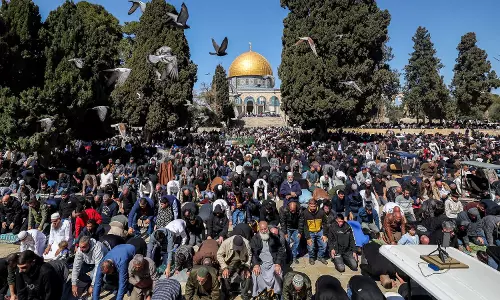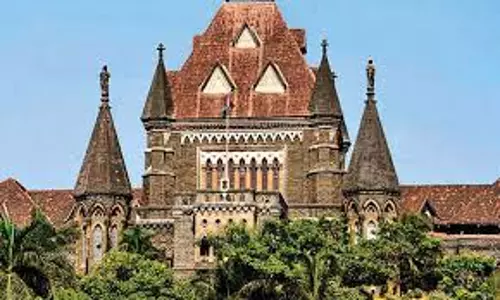
For centuries, this Muslim family is taking care of Shiva temple in Assam
text_fieldsRangmahal (Assam): Deep in the heart of Kamrup district in Assam, under a centuries-old banyan tree sits a pious Muslim offering 'azaan' five times a day.
You might say what is extraordinary about that? Well, Mati 'kai (elder brother) or Haji Matibar Rahman prays by a Shivling, after offering flowers at the Hindu religious icon symbolic of Lord Shiva.
Set against the current ethos of intolerance and hate, the small village of Rangmahal not far away from the Assam's capital Dispur sets a unique example in communal harmony.
Rahman is the seventh generation of the family who have long taken care of one of the oldest temples of Lord Shiva in north Guwahati, only 45 km away from Dispur.
It's 5 a.m., and although all members of his family are still fast asleep Rahman is awake and has just completed his namaz after taking his. The 73-year-old then slowly walks towards the backyard to clean the ancient 'Burha Gosai er thaan', a sacred place where Lord Shiva is worshipped.
His family has been the keepers of this place for over five centuries now. Like his forefathers, Mati kai sweeps clean the 'thaan' (worshiping place) every morning and lights candles for Lord Shiva, who the villager believe, lives there.
"Our family had been taking care of the 'thaan' for several generations. And accordingly my father Tayab Ali gave me the responsibility in 1977 to maintain and take care of it. I took it with great pride and I feel blessed to have served it," said Rahman as he swept the floor.
"I am the seventh generation taking care of the temple and I hope that after me, my sons will look after it," he said.
Explaining the significance behind the family tradition, Rahman narrates a folklore about his forefather Baran Shah, who had a spiritual 'encounter' with Lord Shiva and Shah was given the responsibility to take care of the place.
"The first man in our family to start this tradition was Borhansa. Lord Shiva came to Borhansa and told him that he wanted to live in this place. ‘From now on it will be the responsibility of your family to take care this place. I shall accept service from your family only and no one else' was what Bhanguri Nana told Borhansa. Since my family started maintaining this thaan," said Rahman. (‘Bhanguri' is one addicted to cannabis and ‘Nana' means grandfather).
"We follow Islam and I try to offer all the five namaz. Likewise, I also come here every day to clean this place and light the candles and incense sticks. There is no temple here but for years people are coming here seeking the blessings of Bhanguri Nana. He listens to everyone and fulfils everyone's wish," Rahman said.
"I am getting old now. So after me it has to be my sons who are duty-bound to look after this place. I went for Haj in 2001. During that period one of my two sons looked after this place. I believe once I am gone, one or the other will keep looking after this abode of Bhanguri Nana," he said.
During the month of Shravan, Hindu priests come here to offer puja. "I cannot offer puja but Hindu the priests come here and offer puja. Lots of devotees throng this thaan in the month of June and July. And during the rest of the year it is particularly on Monday that the crowds gather," he said.
"Apart from the Hindus, lots of Muslims also come here and offer 'dua' (prayers). They have a lot of faith as prayers get answered. The numbers of devotees coming here over the years have only increased," said Rahman.
"The Hindus come here to offer prayers, sing 'naam-kirtan' (local religious songs). Bhanguri Nana wants his surrounding to be clean. Without His permission, nothing can be taken from here. Even a branch of a tree cannot be taken without His permission," Rahman, dressed in a long blue kurta, lungi and topi says, "At this old age, I find it difficult to sweep the floor every day. But I try my best to keep it as "clean as possible", he said.
People in this land of Sankardeb and Azan Fakir believe in peace and brotherhood, he insists. Assam is often referred to "Sankar-Ajan'or Desh (land)" after Assamese polymath of the 15th-16th century Sankardeb, and Sufi preacher from Baghdad Azan Fakir -- both had devoted their lives uniting the people of the Brahmaputra valley.
Rahman is proud of the communal harmony in his village. "We have great people here. We have never ever witnessed nor even heard of any kind of communal hatred. The place is surrounded by Muslim families right next to another village that has Hindu majority.
"I have been coming here for last 25 years. I know Rahman and his family for last several years. They have been keeping this place for generations. I come here often as my prayers have been answered and wishes fulfilled by Lord Shiva," said Banti Das, a resident of Guwahati town who often visits the Thaan.
"We know Rahman and his family for generations. They are the keepers of this Than. It is very old and popular," said Md. Salen Ali, a resident of Rangmahal village in North Guwahati.





















